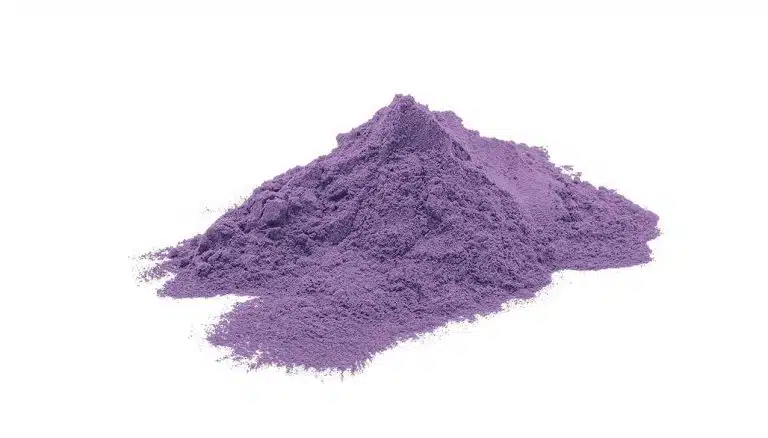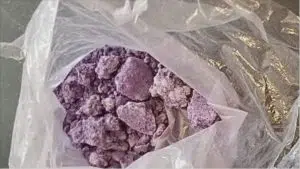What Is Purple Heroin?

Heroin is an extremely powerful opioid drug. It can cause serious health problems, including overdose.
The drug becomes even more dangerous when mixed with other substances. One of the most potent drug mixtures that contain heroin is called purple heroin.
What Is Purple Heroin?

Purple heroin (also called “purp”) is a relatively new street drug that has caused overdose deaths in multiple states, including Michigan and Louisiana. As its name suggests, it’s typically purple, though it may also be gray.
According to the Michigan Department of Health and Human Services, purple heroin may contain all or some of the following substances:
Heroin
Heroin is a semi-synthetic opioid made from the natural opioid morphine. Like other opioids, it slows down your central nervous system. It can reduce pain and make you feel relaxed and happy.
However, it can also slow down your breathing and heartbeat to a life-threatening degree. In addition, it’s highly addictive.
Fentanyl
Fentanyl is a synthetic opioid that’s up to 50 times more powerful than heroin. It’s been linked to numerous overdose deaths throughout the opioid epidemic.
According to the Centers for Disease Control and Prevention (CDC), more than 150 people die every day from overdoses involving fentanyl and other synthetic opioids.
Carfentanil
Carfentanil is a synthetic opioid that’s chemically similar to fentanyl. However, it’s about 100 times more powerful. Veterinarians use it to sedate elephants and other large animals. It’s not intended for human use.
The drug may even be dangerous when accidentally inhaled. That’s why law enforcement officials must take extreme caution when handling it.
Brorphine
Brorphine is a non-fentanyl synthetic opioid. As a relatively new drug, it’s not easily detected in standard blood tests. It also has no accepted medical uses.
Like other synthetic opioids, brorphine poses a high risk of fatal overdose.
Acetaminophen
Acetaminophen is a pain reliever and fever reducer. It’s an active ingredient in various over-the-counter medications, including Tylenol.
When used as directed, acetaminophen is generally safe. However, when abused, it can cause health issues such as rash, facial swelling, and trouble breathing.
It can also cause a life-threatening overdose. Common symptoms of acetaminophen overdose include:
- nausea and vomiting
- sweating
- severe drowsiness
- unexplained bruising or bleeding
Niacinamide
Niacinamide (also called nicotinamide) is a type of vitamin B3. It’s used to prevent vitamin B3 deficiency. Some people also claim it can ease other health problems, including diabetes, acne, and skin discoloration.
Although niacinamide is typically safe, it can cause side effects like headache, dizziness, and rash.
Buspirone
Buspirone is a medication used to treat anxiety. It’s often prescribed under the brand name BuSpar. Potential side effects include headache, diarrhea, and trouble sleeping.
People who abuse buspirone may overdose. Common symptoms of overdose include:
- drowsiness
- dizziness
- blurry vision
- nausea and vomiting
Flualprazolam
Flualprazolam is a benzodiazepine that’s structurally similar to the anti-anxiety medication alprazolam (brand name Xanax). It has no accepted medical uses in the United States.
The drug can cause health issues such as:
- extreme drowsiness
- memory problems
- respiratory depression (slow, ineffective breathing)
In addition, like other benzodiazepines, flualprazolam can be addictive.
Risks Of Purple Heroin
According to public health officials, purple heroin poses an extremely high risk of overdose and addiction.
Overdose
A person who is overdosing on purple heroin may experience:
- nausea and vomiting
- slowed or stopped breathing
- slowed or stopped heartbeat
- pale, clammy skin
- bluish lips and/or fingernails
- loss of consciousness
If you or someone you know experiences these symptoms, call 911, and administer naloxone if you have it. Naloxone (brand name Narcan) is a medication that can rapidly reverse the effects of an opioid overdose. You can get it at most pharmacies without a prescription.
Addiction
Addiction is a serious disease that makes you feel unable to control your drug use. Other symptoms include:
- tolerance (needing increasingly larger or more frequent doses of a drug to feel the desired effects)
- physical dependence (experiencing unpleasant withdrawal symptoms, such as nausea and trouble sleeping, when you don’t use drugs)
- loss of interest in activities you once enjoyed
- loss of motivation
- avoidance of family and friends
- mood swings
People who experience these symptoms should seek professional help at a substance abuse treatment center.
Purple Heroin Addiction Treatment
When you enter an addiction treatment program, a team of medical professionals create a personalized treatment plan. Most treatment plans for heroin addiction start with medical detox. During detox, doctors will help you slowly and safely stop using drugs with minimal withdrawal symptoms.
After completing detox, you can begin therapy. Your therapist will help you cope with triggers (people, places, or other things that make you want to abuse drugs) and other recovery-related challenges. You may also be given medications to ease cravings and withdrawal symptoms
Before you finish treatment, your doctors can help you create an aftercare plan. This plan will include strategies to promote your long-term recovery, such as:
- ongoing therapy
- support groups
- transitional housing
- assistance with education or employment
To learn more about addiction treatment options, please contact an Ark Behavioral Health specialist. Our inpatient and outpatient treatment centers offer comprehensive, personalized care to help you lead a drug-free life.
Written by Ark Behavioral Health Editorial Team
©2024 Ark National Holdings, LLC. | All Rights Reserved.
This page does not provide medical advice.
Centers for Disease Control and Prevention - Fentanyl Facts
National Institute on Drug Abuse - Heroin DrugFacts
United States Drug Enforcement Administration - Carfentanil: A Dangerous New Factor in the U.S. Opioid Crisis
United States National Library of Medicine - Opioid Overdose
Wayne State University - Michigan Poison Center issues warning about 'purple heroin'

Questions About Treatment?
Ark Behavioral Health offers 100% confidential substance abuse assessment and treatment placement tailored to your individual needs. Achieve long-term recovery.
100% confidential. We respect your privacy.
Prefer Texting?
Our friendly support team is here to chat 24/7. Opt out any time.







 Learn More
Learn More








